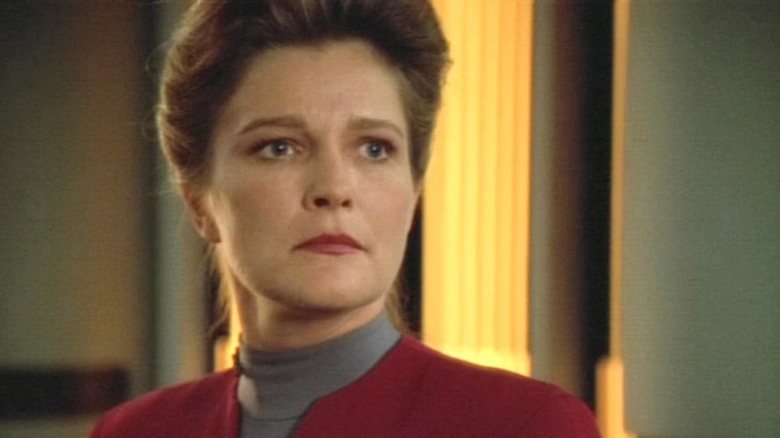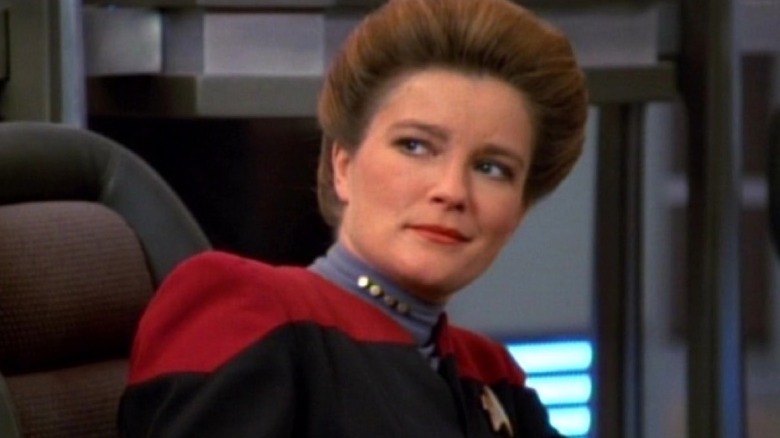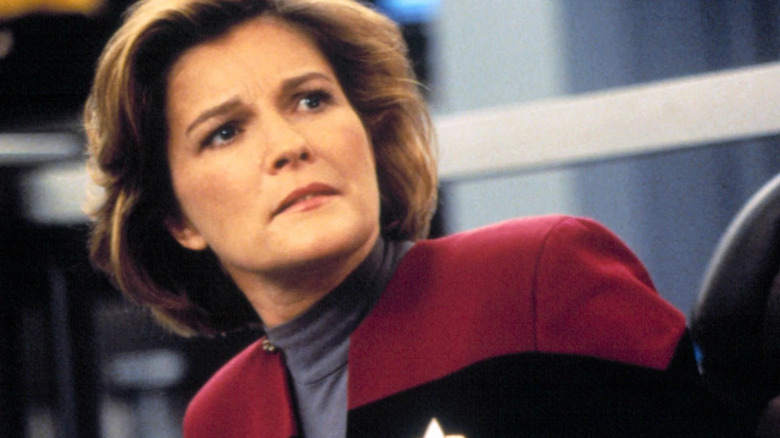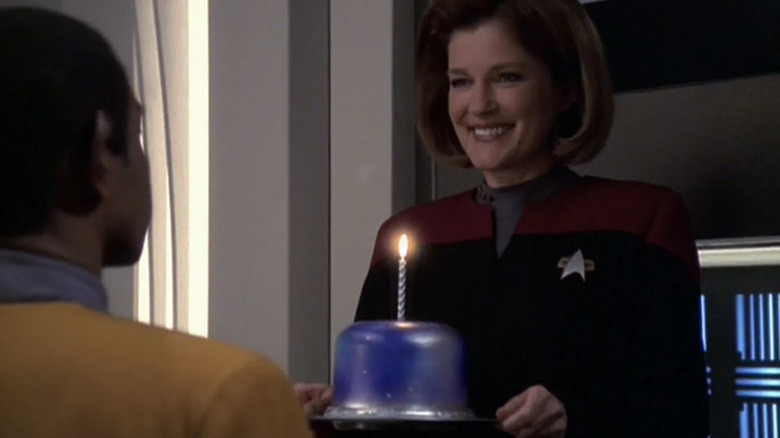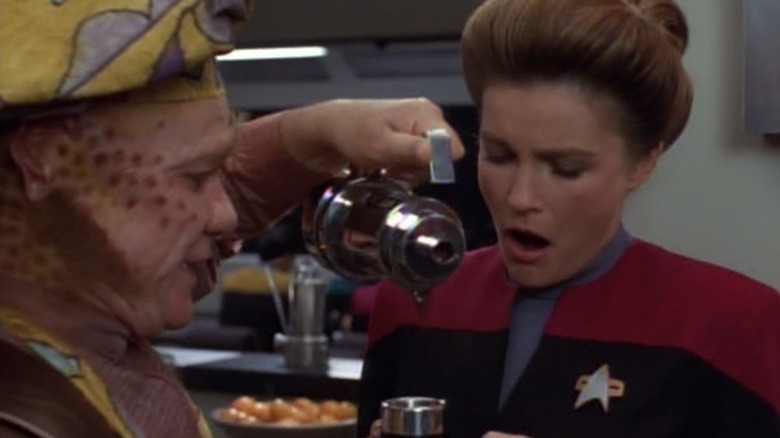Why Star Trek: Voyager's Captain Janeway So Often Clashed With The Franchise's Ideals
When "Star Trek: Voyager" debuted in 1995, Trekkies found themselves in new, exciting territory. Mixing the premises of "Star Trek" and "Lost in Space," "Voyager" saw a Federation starship, the very small but technologically advanced U.S.S. Voyager suddenly whisked clear across the galaxy to a remote quadrant — the Delta Quadrant — that Starfleet hadn't yet explored. Stranded 70 years from Earth, the determined Capt. Janeway (Kate Mulgrew) would have to wrangle an antagonistic crew in their mission to return home, and dramatically, there were going to be no other Starfleet vessels to back them up in a scrape. In the Delta Quadrant, there are no Starbases to replenish their supplies, nor repair damage. They were truly on their own. "Voyager" was to be a test of Starfleet resourcefulness.
Additionally, many members of the Voyager's crew once belonged to the Maquis, a group of anti-Federation terrorists, meaning that Capt. Janeway would have to smooth over Maquis/Starfleet officer relations. Plot points related to the Voyager's limited resources and the Maquis, sadly, were quickly forgotten as the show went on. The ship seemingly never ran out of food or replicator rations, and, in later seasons, could build brand-new shuttlecrafts and entire cartography labs seemingly out of thin air. Where exactly did they get the raw materials required to build the Delta Flyer, for instance?
Most excitingly, "Star Trek: Voyager" featured a type of captain that Trekkies hadn't seen before. Compared to the serious, angry, impatient, and ultra-professional captains of the past, Janeway was enthused, upbeat, energetic, and communicative. She referred to her crew as her family. And, as the show went on, she became more and more of an authoritarian. Janeway, it seems, was quite willing to break rules if it served her own ideas.
A great character, but maybe a bad person
This is not to say that Capt. Janeway was a bad character, nor does it imply that Mulgrew did not give an intense and well-rounded performance over the show's seven seasons. But Janeway, when looking at her actions, came to respect individuals on her ship less and less, and her own authority more and more. On the Enterprise, several characters were capable of taking command, often just so the captain could take a rest. DS9 was overseen by the gruff Capt. Sisko (Avery Brooks), but he had a diverse team that all seemed capable of gathering together to solve unusual problems. On the U.S.S. Voyager, power started at the top and stayed there. Janeway was no tartar and perhaps no dictator, but it was rare that she deferred to the group.
Only one person got to sit in the captain's chair. "Voyager" doesn't necessarily promote authoritarianism, but it does seem to argue that, in desperate times, it may be necessary.
There are myriad examples of Janeway's cavalier attitudes. For instance, in the episode "Scientific Method" (October 29, 1997), a group of invisible alien scientists has moved on board the ship and has deliberately been giving the Starfleet officers incurable headaches as a means of studying their behavior under pressure. The experiments go too far, and the aliens accidentally kill one of the crew. The aliens reveal themselves and say they'll stay on board regardless, not really caring about human life. In response, Janeway takes control of the helm and immediately steers her ship in between two binary stars, a route that could very likely destroy them all.
Instigating an astral game of chicken, Janeway says she'll steer away if the aliens leave. They do.
Were I a member of Janeway's crew, I would have liked a chance to debate that tactic before she put my life at risk. Although to be fair, Janeway was also suffering from headaches and was perhaps not thinking clearly.
The Tuvix incident
Infamously, in the episode "Tuvix" (May 6, 1996), Janeway found that two of her crew members, Neelix (Ethan Phillips) and Tuvok (Tim Russ), had been accidentally blended together in a transporter malfunction. The resulting being called himself Tuvix (Tom Wright) and found that he very much enjoyed being alive. When Janeway discovered that she could separate her two (now dead) crewmates, Tuvix objected, as did the ship's doctor (Robert Picardo). It would not be ethical, Tuvix argued, to kill one being in order to restore two others to life. Janeway, however, orders it done anyway, and Tuvok and Neelix are resurrected.
Mulgrew has been asked about Tuvix many, many times since that episode aired, notably by Alexandra Ocasio Cortez on Twitter. She has remained stalwart in her response: Janeway did the right thing and would do it again. She felt that her dead crew members, just as much as Tuvix, had a right to live. These responses haven't prevented Tuvix from becoming a meme that highlights Janeway's brusque dismissal of his life.
After a while, it became clear that Janeway's crew was not operating as a team, but as subservient inferior officers underneath an absolute ruler. It was subtle, of course. Janeway never declared herself dictator-for-life or anything so crass. But on the rare occasions that someone did stand up to Janeway, it felt like a strange aberration. No one, it seems, dared doubt her. Even when she was making questionable decisions.
The reason for Janeway's behavior
This was illustrated in the episode "Year of Hell, Part II" (November 12, 1997). When the Voyager was in extremely dire straits — thanks to some temporal rigmarole, the ship was damaged nearly beyond repair and many died — Seven of Nine (Jeri Ryan) questions Janeway's decision to attack the time-traveling antagonist. Janeway overrules her objections, and the crew is ordered to fulfil her mission.
Seven of Nine, once a Borg drone with no individuality, was pleased that she had the agency to stand up for herself. With Janeway, that agency was taken away again. Seven, bafflingly, seems to accept it. "As a Borg," she said "I submitted to a single authority, the Collective. Over the past several months, I've been encouraged to think and act as an individual. It is difficult to know when to restrain myself." Tuvok advises, illogically, that the captain is always right. "Even when you know her logic is flawed?" Seven asks. "Perhaps," Tuvok says.
It doesn't matter if she's making illogical decisions, the captain is in charge. Even the crew thinks so.
There is, however, a logical reason for Janeway's authoritarian command style, and it has nothing to do with her taste for power.
Because the Voyager will never receive any kind of Starfleet aid, there will necessarily be no comforting status quo. The structured rigors of Starfleet are absent, and endless improv remains. The ship will be in "crunch time" for the foreseeable future, and Janeway will require consistency. This is not a time to allow officers to grow and develop their own voice among the crew, as that will create an imbalance of command.
Command in difficult times
Why else would the ultra-capable Harry Kim (Garrett Wang) never receive a promotion? Poor Harry, despite his level head and intelligence, remained an ensign for seven years. Even Kim acknowledged in the episode "Nightingale" (November 22, 2000) that hierarchy was required to function. "I understand there's a command structure and that our circumstances are unique," Harry said, "But the fact is, if we were back home, I'd be a lieutenant by now." This was one of the few times Janeway's implied insistence on the consistency of command was mentioned aloud.
But, this is "Star Trek," of course, and not a character study along the lines of "Breaking Bad" — we are not witnessing a human's moral downfall. Although notions of authoritarianism thematically lurk in the series, "Voyager" never openly rolls with the darkness. Indeed, Janeway is even a little startled by herself sometimes. In the show's final episode, "Endgame" (May 31, 2001) an older Janeway travels back in time to help present-day Janeway get back home, suggesting killing a bunch of Borg and providing contraband future technology. Present-day Janeway is shocked by her future self's lack of decorum. Even Janeway was startled by Janeway's cavalier attitude.
The notion of an authoritarian rule being required in desperate times was, in fact, something that would play out in the real world shortly after the conclusion of "Star Trek: Voyager." Following the events of 9/11, one could soon see a sudden channeling of power and authority to the top of the U.S. government in the George W. Bush administration. The rhetoric of the time was that extreme times called for extreme measures. Five months after "Voyager" went off the air, the spy series "24" became an immediate hit, and that show was predicated largely on the necessity of dark, extreme actions in the face of severe crimes and a ticking clock.
"Voyager," being "Star Trek," was never so mercenary as that. But it was dealing, overall and with a great deal of foresight, with a sticky philosophical ethic about the nature of command when the "safety net" of Starfleet is removed. One may not agree with Janeway's tactics or command style — she seems like she'd be a crappy boss — but one can wholeheartedly understand her command ethos.
